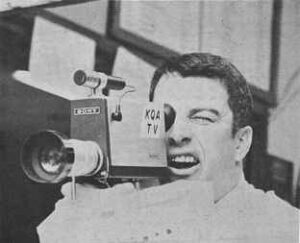
This little toy is used at demonstrations to provide photographic proof of police actions and “individuals engaged in the commission of illegal acts.”
The American Civil Liberties Union thinks that their use is probably unconstitutional. Next time you see one of them at a demonstration put your picket sign in front of it or stand in their way, but be careful not to knock one to the ground because they are very expensive and break easily. Photo by A. Gotkin.
“A conspiracy is like a circle.”
–Detroit Recorder’s Court Judge Thomas Poindexter
CHICAGO, April 9–In a fourth-floor banquet hall, high atop the downtown “Y,” overlooking the stately Conrad-Hilton Hotel; a conspiracy meets.
Jerry Rubin, Abbie Hoffman, Dave Dellinger, Rennie Davis and Bobby Seale are discussing their case with attorneys.
They were all indicted for conspiracy by a federal grand jury, accused of crossing state lines to foment civil disorder. They’re all back in Chicago to be arraigned on the charges that grew out of the violence that occurred during the 1968 Democratic National Convention.
The arraignment takes place in Chicago’s glass-and-steel Federal Building. Ten federal marshals and 45 city policemen are standing around to maintain lawnorder.
One of the marshals stops a young black at the door to the court room. “Take that hat off,” he orders, pointing to the purple beret the man is sporting. The black points to a uniformed policeman: “If he take his hat off, I take mine off.”
“Throw him out,” the marshal orders. The crowd hoots.
In walks the judge, 74-year old Julius J. Hoffman–who is bald.
He looks down at young, long-haired Abbie Hoffman, who is wearing a blue shirt bearing the insignia of the Chicago Police Department. Jerry Rubin is wearing “Jimmy Hoffa for President,” and “Jerry Rubin for Mayor” buttons.
Dave Dellinger, when asked how he pleads, replies: “Obviously not guilty. The guilty party has not yet been indicted.”
“There will be no speeches,” says the judge, “How do you plead?”
“I said obviously not guilty.”
“Obviously has nothing to do with it.” the judge retorts. He instructs Dellinger’s attorney to advise his client. “Sir, he has pleaded,” the lawyer answers.
The judge says no he hasn’t, and he’d better. “Not guilty,” Dellinger finally says. “Now that’s the way to do it,” the judge says.
“Not guilty,” pleads Abbie Hoffman.
“Let the record show that Mr. Rubin pleaded guilty with a fist raised in the air,” the judge instructs the stenographer.
“He pleaded not guilty,” Rubin’s attorney says.
“I’m sorry, but that raised fist confused me,” the judge replies, “I didn’t know whether it was directed at me or not.”
